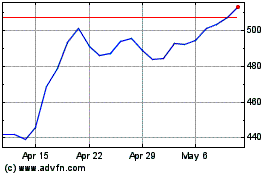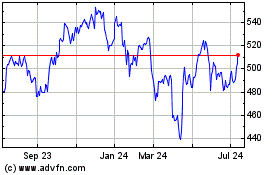Health Insurer Shuns 'Unproven' Amniotic-Tissue Products -- Update
August 15 2018 - 8:58PM
Dow Jones News
By Gretchen Morgenson
United Healthcare, one of the nation's largest insurance
companies, has determined that amniotic tissue products made by
MiMedx Group Inc. and other manufacturers are "unproven and/or not
medically necessary for any indication," and won't reimburse
patients for their use, according to the insurer's most recent
medical policy update bulletin.
The updated policy at United Healthcare, which goes into effect
Oct. 1, came about because of "insufficient clinical evidence of
safety and/or efficacy in published peer-reviewed medical
literature" about the products, the bulletin said.
"Due to limited studies, small sample sizes, and weak study
designs, there is insufficient clinical evidence to conclude that
these skin substitutes have an improved health outcome over
standard therapies; well-designed, randomized comparative clinical
trials are needed to demonstrate the efficacy and safety of these
products," United Healthcare said.
"Unlike many other insurers, UnitedHealthcare has not covered
MiMedx products, so this does not represent a change in coverage,"
said a MiMedx spokesman. "We look forward to continuing to build on
our compendium of clinical studies to help gain coverage in the
future."
The products, which include wound patches and injectable
products made of amniotic tissue, have been aggressively promoted
to treat a variety of ailments, including erectile dysfunction,
osteoarthritis and hair loss.
The decision by the giant insurer, whose parent company is
UnitedHealth Group Inc., hasn't been publicly reported and
coincides with a similar policy change by Health Care Services
Corp., the parent of Blue Cross/Blue Shield operations in five
states.
On Aug. 1, Health Care Services said it wouldn't reimburse
patients for injectable amniotic-tissue products, saying they are
experimental and investigational. It also said it would limit
reimbursement for wound patches made from the material.
After The Wall Street Journal reported on that change, MiMedx
issued a news release Wednesday saying the company "continues to
build its compendium of clinical studies, including numerous
randomized controlled studies, to support the use of EpiFix," an
amniotic skin graft.
Once a highflying health-care company, MiMedx is facing an array
of woes. It is in the process of restating its financial results
back to 2012, and its founder, Parker H. "Pete" Petit, has been
removed as chief executive, although he remains on the board. Its
shares, which peaked at nearly $18 earlier this year, have fallen
to below $4.
The company prospered after it acquired a seller of treatments
in 2011 meant to heal wounds more quickly. The products, made from
placentas from women who have given birth by caesarean section,
were lightly regulated and relatively inexpensive to make.
MiMedx takes the amniotic membrane -- thin, moist tissue that
protects the fetus -- and processes it into wound patches or grinds
it into a powder that can be applied topically or by injection.
A recent Wall Street Journal investigation detailed allegations
by former employees that MiMedx improperly booked revenue when it
shipped goods, rather than when the products were used. Its
practices are under investigation by the Justice Department, the
Department of Veterans Affairs and the Securities and Exchange
Commission.
The Marietta, Ga.-based company has said its board's audit
committee is conducting an independent investigation into "certain
sales and distribution practices and other matters" and that it is
cooperating fully with regulatory agencies, but didn't
elaborate.
Write to Gretchen Morgenson at gretchen.morgenson@wsj.com
(END) Dow Jones Newswires
August 15, 2018 20:43 ET (00:43 GMT)
Copyright (c) 2018 Dow Jones & Company, Inc.
UnitedHealth (NYSE:UNH)
Historical Stock Chart
From Mar 2024 to Apr 2024

UnitedHealth (NYSE:UNH)
Historical Stock Chart
From Apr 2023 to Apr 2024
